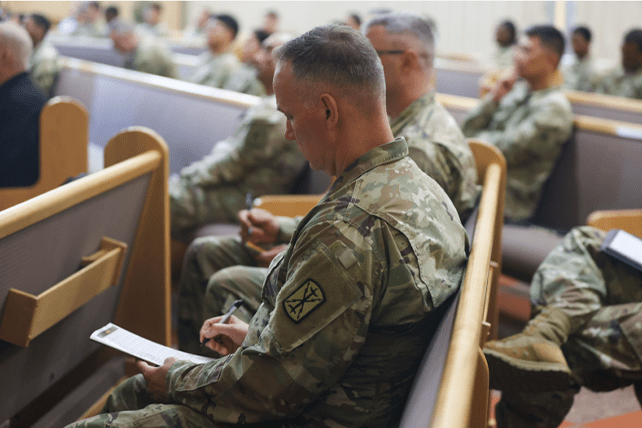Jones believes he has been targeted by ACNA leaders in part because he has been a vocal critic of the archbishop’s leadership and because of his attempts to gain greater autonomy and formal status for JAFC. The bylaws currently treat the Special Jurisdiction of the Armed Forces as an entity without the independence of a diocese. In protest, Jones said, they recently withheld direct financial support to ACNA.
A spokesperson for ACNA told RNS that there’s “no documented agreement or understanding” that any of JAFC’s decisions involving tithes to the denomination related to bylaw concerns.
Jones said that, despite these disputes, he was willing to participate when Wood told him on Sept. 12 that a third-party investigator would be looking into the allegations. That changed, Jones said, when church lawyers informed him that the archbishop wasn’t authorized to order an investigation, especially at that juncture. Instead, formal charges must first be brought against Jones and referred to a Board of Inquiry, a 10-person body responsible for overseeing any investigation.
ACNA leaders defended the proposed investigation, saying, “It is customary for the province to complete an initial investigation into credible claims to determine if any rise to the level of a presentable offense,” a spokesperson told RNS via email. (ACNA, though an independent denomination, calls itself a province of a group of dissenting churches.)
Believing the proposed investigation to be unlawful, however, JAFC’s church lawyers and executive committee reportedly instructed Jones and anyone affiliated with the JAFC not to cooperate. According to a statement from the JAFC, the nonprofit is currently “in discussions with several provinces in the global Anglican Communion to provide continued connection between the JAFC and the Communion.”
Jones believes these events are part of a broader theological clash between Anglican complementarians — who typically restrict leadership roles to men — and egalitarians, who are more in favor of women in church leadership. ACNA does not allow women to be made bishops but allows its regional bodies to determine whether to ordain women priests and deacons.
Jones, a complementarian, alleges that Wood has been slow to bridge differences. “(Archbishop) Steve promised that he was going to navigate those waters well, but in fact, has hired nothing but egalitarian staff, in training bishops, has nothing but egalitarian bishops. He’s trying to push an agenda,” said Jones.
But Barto said the clash is more about ACNA’s need for more clear, comprehensive and transparent bylaws.
“I think that what this crisis illustrates is the limits of authority on the part of the Province, the Anglican Church in North America, and particularly the Archbishop and the challenge of holding bishops accountable for misconduct,” he said. “This underscores the need for canonical reform in ACNA.”
This article originally appeared here.

